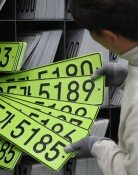Kia Motors and Ssangyong Motor Company: Exports to Europe Suspended
Kia Motors and Ssangyong Motor Company: Exports to Europe Suspended
Posted March. 04, 2005 22:29,
As Kia Motors and Ssangyong Motor Co. have been found to fall short of carbon dioxide (CO₂) emission standards, exports from these companies to European regions have been suspended.
This is the first interdiction on a domestic business since the Kyoto Protocol, which aims for the decrease of greenhouse gases, went into effect in February, and is denoted as a warning flare for a full-scale environmental regulation.
It was discovered on March 4 that Kia Motors and Ssangyong Motor Co. received notices from the Korea Automobile Manufacturers Association (KAMA) in late February, demanding a restraint in European exports until they meet CO₂emission standards.
Because the dispatches are according to the CO₂reduction treaty between Korean automobile company representative KAMA and the European Union (EU) Commission, in reality they are compulsory export limiting measures in nature.
KAMA managing director Kim So-rim revealed, Last years average CO₂discharge for European export-modeled Kia cars yielded 175g/km per automobile, and 243.5g/km for a Ssangyong, so to adjust to the targeted 170g/km, we requested an export restraint.
According to the 1999 contract signed by KAMA and the EU Commission to reduce greenhouse gases, Korean automobile companies must decrease the CO₂emission in Europe export models from 183g/km to 140g/km before 2009. In addition, an interim objective was negotiated to lower CO₂discharge to 170g/km before the end of 2004.
The CO₂agreement is purportedly an autonomic compliance, but as a violation would engender various disadvantages in exporting cars to Europe after the year 2009, it is actually a strict coercive provision.
The average CO₂discharge of 170.8g/km for Korean-made cars neared its goal last year, but with a high ratio of recreational vehicles (RV), Kia Motors and Ssangyong Motors exceeded the goal.
Sources at a automobile industry said, We must cut back on the amount of European exports itself or slash the proportion of RVs to reduce CO₂ and added, Because Kia Motors has diverse car models, they could increase subcompact car exports instead of RVs, but it is difficult for Ssangyong Motor Co. to meet regulations because it consists mostly of RVs.
He also tipped off, Highly strategic policies are being employed, such as delaying registration by deferring sales in Europe locales for the cars that have already shipped.
Due to a weak dollar and other factors, the domestic automobile industry is fortifying marketing strategies in Europe, and the amount of Korean cars exported to Europe last year reached approximately 810,000, leaping 37.6 percent from the previous year.
Also, the proportion of total exports to Europe increased to 34.1 percent in 2004 from 32.5 percent in 2003, and jumped to 35.9 percent in January 2005.
Ki-Jeong Ko koh@donga.com
Headline News
- N. Korea launches cyberattacks on S. Korea's defense companies
- Major university hospital professors consider a day off each week
- Italy suffers from fiscal deficits from ‘Super Bonus’ scheme
- Inter Milan secures 20th Serie A title, surpassing AC Milan
- Ruling and opposition prioritize spending amid tax revenue shortfalls







